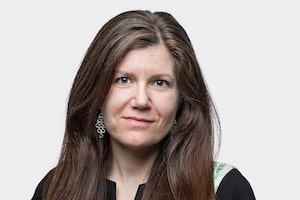Dr. Ravi Patel walks with his son Krish (3) as he drops him off for school at the Calgary French and International School on Sept. 14, 2010. This year, with kids returning to class amid the pandemic, parents and staff have varied access to information about potential COVID-19 exposures, depending on their school district and social networks.Dave Chidley/The Globe and Mail
Alberta’s school boards and parents are relying on goodwill and gossip to protect students and staff from the novel coronavirus now that the province has stopped universal contact tracing and no longer alerts administrators when someone tied to their institution tests positive for COVID-19.
This school year, Alberta will only inform parents of a potential outbreak at their child’s school when 10 per cent of students miss class owing to illness. Alberta Health Services has sent some parents letters warning of potential outbreaks, but the government would not confirm how many schools have crossed the 10-per-cent threshold. The coronavirus, however, is circulating in schools that have not hit the trigger, and some local officials and parents have created makeshift warning systems to fill the information vacuum.
This disjointed approach means parents and staff have varied access to information about potential COVID-19 exposures, depending on their school district and social networks. Even if information is available, it is incomplete because administrators are relying on parents and staff to volunteer their health status. Critics argue the Alberta government, by not disclosing infection information to administrators, is putting pupils and staff at risk of contracting the virus that is ripping through the unvaccinated population, including children under 12 who are ineligible for shots.
Edmonton Catholic Schools reinstate COVID-19 rules while awaiting provincial guidance
Prairie Rose Public Schools (PRPS), which serves rural communities in southeastern Alberta, is one of the few boards taking an aggressive approach to distributing information. The district posts online bulletins disclosing, to the best of its knowledge, how many cases of COVID-19 are active in each school and which classes may have been exposed.
Roger Clarke, the district’s superintendent, said PRPS believed it would be unfair to withhold such information from the community. The district relies on the honour system to gather data.
“Parents want to look out for the health and safety of their children,” Mr. Clarke said. “If they don’t know there’s COVID-19 in their child’s classroom or their child’s school, how can they make the informed decision they may want to make?”
He views the decision through a moral lens: “I certainly wouldn’t want, as a superintendent, spread to happen in our schools where a student got very, very sick and potentially died and we didn’t inform the parents that there was COVID in the school.”
So far, children in Alberta have been spared from severe outcomes after contracting COVID-19. The youngest person to die of the illness was 20. Alberta counts 27 children between the ages of 5 and 9 who have been admitted to hospital with COVID-19, and 12 of them ended up in an intensive-care unit. Another 181 people between the ages of 10 and 19 have been admitted, with 24 of them landing in an ICU.
Alberta’s hospital system is struggling under the fourth wave, forcing AHS to cancel all elective surgeries in Calgary and some operations in other areas. This surge, coupled with Alberta’s new policy of withholding information about COVID-19 exposures in schools, makes parents such as Vanessa Porteous nervous. Her child, who is too young to be vaccinated, attends an elementary school in Calgary.
“How are we being asked to make our ‘personal responsibility’ decisions in the absence of any information?” she said. “That doesn’t even add up.”
Ms. Porteous relies on gossip to gauge whether her child is at risk. But gossip, she noted, is unreliable. She said the “language of individual freedom and privacy” has hijacked the public-health debate.
“My child could get long-COVID to preserve my neighbour’s privacy,” she said.
The Calgary Board of Education announced on Friday that schools would notify parents in the event of a positive case, but only if families report those cases themselves; the information will not come from AHS.
Alberta in August said it would not require masking or other public-health measures in schools, but local school trustees were free to implement further restrictions. This resulted in a patchwork of rules that are shifting quickly as COVID-19 cases rise in Alberta. Frustrated school boards are angry the provincial government left it to local education officials to set contentious health policies. Alberta late last week reinstituted a provincewide mask mandate, but schools are exempt.
Mark Davidson is the superintendent of Medicine Hat Public School Division, which has identified COVID-19 cases in all of its schools. But the division is not distributing specific information to parents, such as what classes may have been exposed.
“Alberta Health Services cautioned us against doing that,” he said, adding AHS warned of “challenges we could face with respect to confidentiality of student information.” The health authority did not reply to questions about Mr. Davidson’s statement.
AHS shifted its COVID-19 reporting policies for schools because “outbreaks in schools could be caused by a number of different respiratory viruses, not just COVID,” spokeswoman Lisa Glover said in a statement.
“AHS is no longer informing school authorities or administrators of individual cases of COVID-19 within the school setting, as notification to the school is not required for the management of that individual,” she wrote, noting people who test positive for the virus must still isolate.
AHS may declare “an outbreak of a respiratory illness at the school” if 10 per cent of students are absent because they are sick. “A reporting framework for respiratory illness outbreaks in schools is expected to be finalized soon.”
We have a weekly Western Canada newsletter written by our B.C. and Alberta bureau chiefs, providing a comprehensive package of the news you need to know about the region and its place in the issues facing Canada. Sign up today.
 Carrie Tait
Carrie Tait